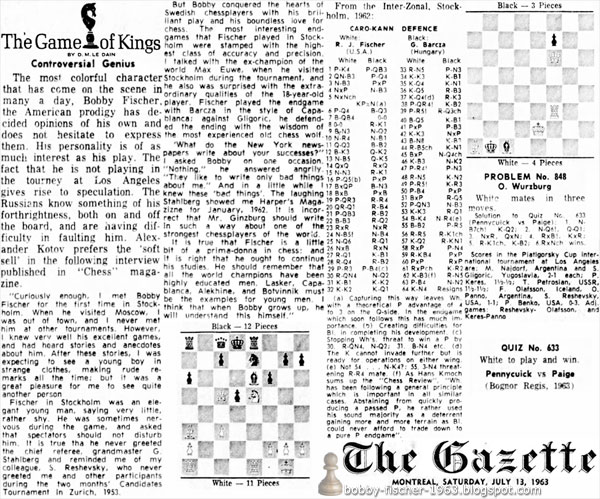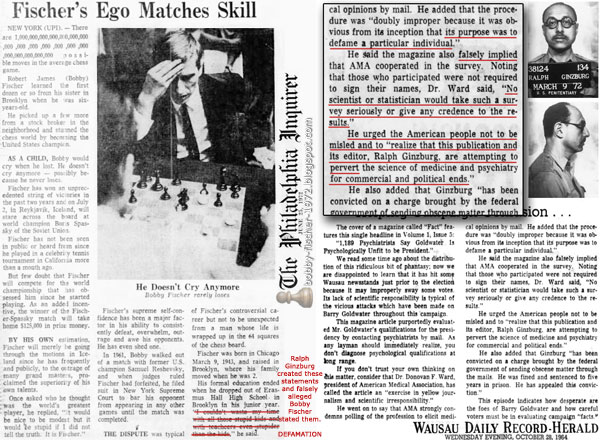Malice
“Jury Gets Goldwater's Suit”
Des Moines Tribune, Des Moines, Iowa, Friday, May 24, 1968 - Page 6
“Controversial Genius”
The Gazette Montreal, Quebec, Canada Saturday, July 13, 1963 - Page 39
Two Questions:
- If the Ginzburg smut were true, why wasn't Bobby pleased with it?
- How did Stahlberg know to pick, specifically, Ginzburg's smut out of many publications? Referee Stahlberg was Jewish, right? Why was he laughing if Bobby were at all, anti-Jewish or half the lies printed in Harpers? “Laughing Stahlberg”?? I don't think slander is funny. Nor did Barry Goldwater when he successfully SUED Ginzburg for pulling the same smutty defamation peddling stunt on himself only a few years later.
The Gazette Montreal, Quebec, Canada Saturday, July 13, 1963 - Page 39 (★)
Controversial Genius
The most colorful character that has come on the scene in many a day, Bobby Fischer, the American prodigy has decided opinions of his own and does not hesitate to express them. His personality is of as much interest as his play. The fact that he is not playing in the tourney at Los Angeles gives rise to speculation. The Russians know something of his forthrightness, both on and off the board, and are having difficulty in faulting him. Alexander Kotov prefers the ‘soft sell’ in the following interview published in “Chess” magazine.
“Curiously enough, I met Bobby Fischer for the first time in Stockholm. When he visited Moscow, I was out of town, and I never met him at other tournaments. However, I knew very well his excellent games, and had heard stories and anecdotes about him. After these stories, I was expecting to see a young boy in strange clothes, making rude remarks all the time; but it was a great pleasure for me to see quite another person.
Fischer in Stockholm was an elegant young man, saying very little, rather shy. He was sometimes nervous during the game, and asked that spectators should not disturb him. It is true that he never greeted the chief referee, grandmaster G. Stahlberg and reminded me of my colleague, S. Reshevsky, who never greeted me and other participants during the two months' Candidates Tournament in Zurich, 1953.
But Bobby conquered the hearts of Swedish chess players with his brilliant play and his boundless love for chess. The most interesting endgames that Fischer played in Stockholm were stamped with the highest class of accuracy and precision. I talked with the ex-champion of the world Max Euwe, when he visited Stockholm during the tournament, and he also was surprised with the extraordinary qualities of the 18-year-old player. Fischer played the endgame with Barcza in the style of Capablanca; against Gligoric, he defended the ending with the wisdom of the most experienced old chess wolf.
‘What do the New York newspapers write about your successes?”
I asked Bobby on one occasion. “Nothing,” he answered angrily. ”They like to write only bad things about me.” And in a little while I knew these ‘bad things’. The laughing Stahlberg showed me Harper's Magazine for January 1962. It is incorrect that Mr. Ginzburg should write in such a way about one of the strongest chess players of the world.
It is true that Fischer is a little bit of a prima-donna in chess; and it is right that he ought to continue his studies. He should remember that all the world champions have been highly educated men. Lasker, Capablanca, Alekhine, and Botvinnik must be the examples for young men. I think that when Bobby grows up, he will understand this himself.”
How Ralph Ginzburg's “yellow journalism” destroyed what would have been a great article…
The Philadelphia Inquirer Philadelphia, Pennsylvania Sunday, June 25, 1972 - Page 54
Fischer's Ego Matches Skill
New York (UPI). — There are 100,000,000,000,000,000,000,000,000,000,000,000,000,000,000,000,000,000,000,000 possible moves in the average chess game.
Robert James (Bobby) Fischer learned the first dozen or so from his sister in Brooklyn when he was six-years-old.
He picked up a few more from a stock broker in the neighborhood and stunned the chess world by becoming the United States champion.
AS A CHILD, Bobby would cry when he lost. He doesn't cry anymore — possibly because he never loses.
Fischer has won an unprecedented string of victories in the past two years and on July 2, in Reykjavik, Iceland, will stare across the board at world champion Boris Spassky of the Soviet Union.
Fischer has not been seen in public or heard from since he played in a celebrity tennis tournament in California more than a month ago.
But few doubt that Fischer will compete for the world championship that has obsessed him since he started playing. As an added incentive, the winner of the Fischer-Spassky match will take home $125,000 in prize money.
BY HIS OWN estimation, Fischer will merely be going through the motions in Iceland since he has frequently and publicly, to the outrage of many grand masters, proclaimed the superiority of his own talents.
Once asked who he thought was the world's greatest player, he replied, “It would be nice to be modest but it would be stupid if I did not tell the truth. It is Fischer.”
Fischer's supreme self-confidence has been a major factor in his ability to consistently defeat, overwhelm, outrage and awe his opponents. He has even shed one.
In 1961, Bobby walked out of a match with former U.S. champion Samuel Reshevsky, and when judges ruled Fischer had forfeited, he filed suit in New York Supreme Court to bar his opponent from appearing in any other games until the match was completed
THE DISPUTE was typical of Fischer's controversial career but not to be unexpected from a man whose life is wrapped up in the 64 squares of the chess board.
Fischer was born in Chicago March 9, 1943, and raised in Brooklyn, where his family moved when he was 2.
His formal education ended when he dropped out of Erasmus Hall High School in Brooklyn his junior year.
Helping Campaign Confusion. . .
Wausau Daily Herald, Wausau, Wisconsin, Wednesday, October 28, 1964 - Page 10
[Editing Note: The Education System failed Bobby. He was on the Autism Spectrum. Along came Ralph Ginzburg to inject his own political agenda into the mix, creating a faux narrative… Bobby was rebellious, arrogant, “stupid teachers” (fake quotes) “stupid women” (fake quotes) “stupid kids” (fake quotes) attributed to Bobby because he dropped out of a BROKEN EDUCATION SYSTEM.


























